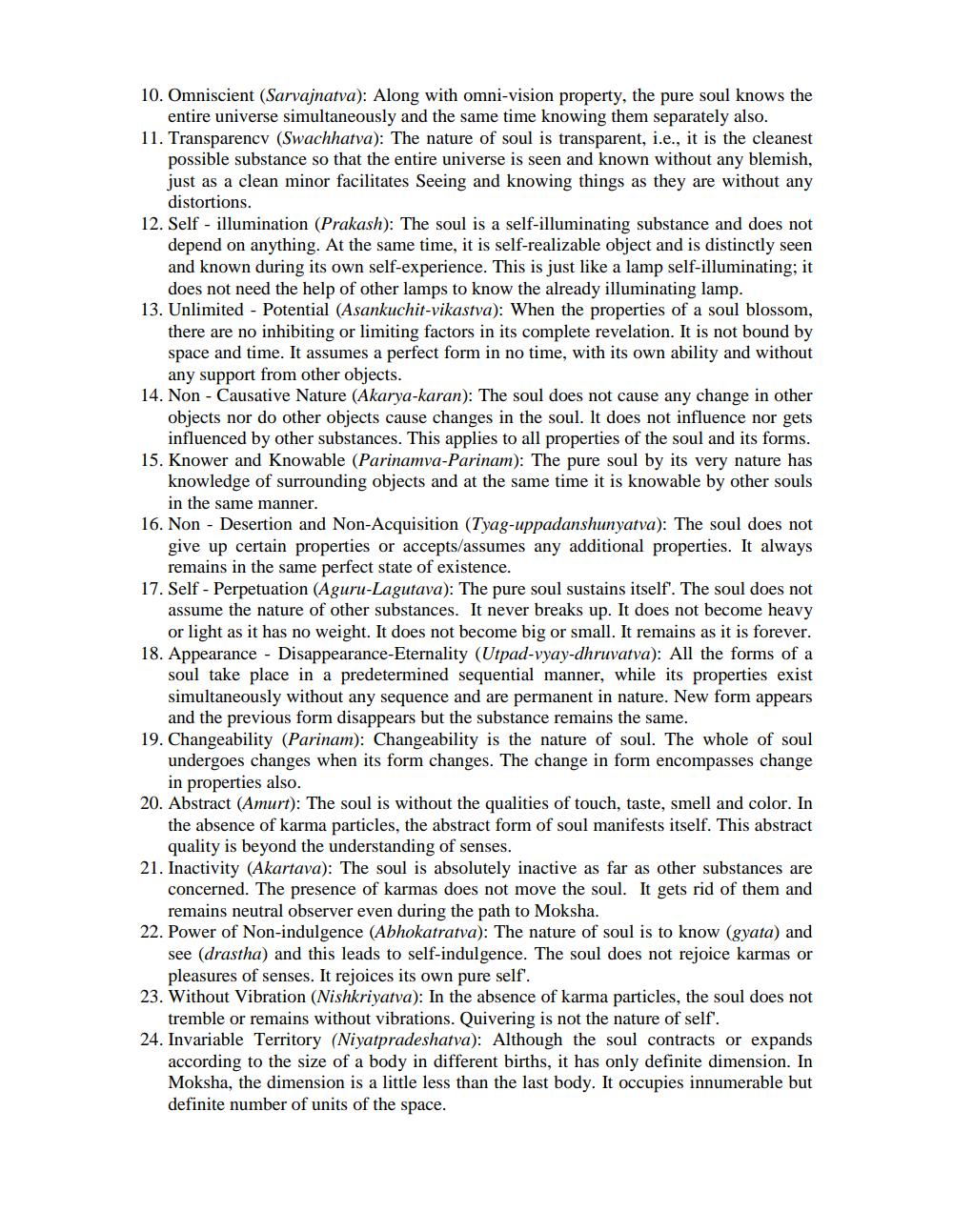Book Title: Key to Moksha Author(s): Jayantilal Jain Publisher: Jayantilal Jain View full book textPage 2
________________ 10. Omniscient (Sarvajnatva): Along with omni-vision property, the pure soul knows the entire universe simultaneously and the same time knowing them separately also. 11. Transparency (Swachhatva): The nature of soul is transparent, i.e., it is the cleanest possible substance so that the entire universe is seen and known without any blemish, just as a clean minor facilitates Seeing and knowing things as they are without any distortions. 12. Self - illumination (Prakash): The soul is a self-illuminating substance and does not depend on anything. At the same time, it is self-realizable object and is distinctly seen and known during its own self-experience. This is just like a lamp self-illuminating; it does not need the help of other lamps to know the already illuminating lamp. 13. Unlimited - Potential (Asankuchit-vikastva): When the properties of a soul blossom, there are no inhibiting or limiting factors in its complete revelation. It is not bound by space and time. It assumes a perfect form in no time, with its own ability and without any support from other objects. 14. Non - Causative Nature (Akarya-karan): The soul does not cause any change in other objects nor do other objects cause changes in the soul. It does not influence nor gets influenced by other substances. This applies to all properties of the soul and its forms. 15. Knower and Knowable (Parinamva-Parinam): The pure soul by its very nature has knowledge of surrounding objects and at the same time it is knowable by other souls in the same manner. 16. Non - Desertion and Non-Acquisition (Tyag-uppadanshunyatva): The soul does not give up certain properties or accepts/assumes any additional properties. It always remains in the same perfect state of existence. 17. Self - Perpetuation (Aguru-Lagutava): The pure soul sustains itself. The soul does not assume the nature of other substances. It never breaks up. It does not become heavy or light as it has no weight. It does not become big or small. It remains as it is forever. 18. Appearance - Disappearance-Eternality (Utpad-vyay-dhruvatva): All the forms of a soul take place in a predetermined sequential manner, while its properties exist simultaneously without any sequence and are permanent in nature. New form appears and the previous form disappears but the substance remains the same. 19. Changeability (Parinam): Changeability is the nature of soul. The whole of soul undergoes changes when its form changes. The change in form encompasses change in properties also. 20. Abstract (Amurt): The soul is without the qualities of touch, taste, smell and color. In the absence of karma particles, the abstract form of soul manifests itself. This abstract quality is beyond the understanding of senses. 21. Inactivity (Akartava): The soul is absolutely inactive as far as other substances are concerned. The presence of karmas does not move the soul. It gets rid of them and remains neutral observer even during the path to Moksha. 22. Power of Non-indulgence (Abhokatratva): The nature of soul is to know (gyata) and see (drastha) and this leads to self-indulgence. The soul does not rejoice karmas or pleasures of senses. It rejoices its own pure self'. 23. Without Vibration (Nishkriyatva): In the absence of karma particles, the soul does not tremble or remains without vibrations. Quivering is not the nature of self'. 24. Invariable Territory (Niyatpradeshatva): Although the soul contracts or expands according to the size of a body in different births, it has only definite dimension. In Moksha, the dimension is a little less than the last body. It occupies innumerable but definite number of units of the space.Page Navigation
1 2 3 4
